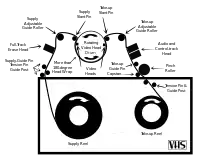Recording head
A recording head is the physical interface between a recording apparatus and a moving recording medium. Recording heads are generally classified according to the physical principle that allows them to impress their data upon their medium. A recording head is often mechanically paired with a playback head, which, though proximal to, is often discrete from the record head.
Types
The two most common forms of recording head are:
- Magnetic - Magnetic recording heads use the principles of electromagnetism to coerce a paramagnetic recording medium, such as iron oxides, to orient in a readable manner such as magnetic tape. Record heads are constructed of laminated permalloy, ferrite, or sendust. As of 2006, this is the most dominant type of head in use.
- Optical - Optical recording heads use the principles of optics and light to impart energy on a recording medium, which accepts the energy in a readable manner, e.g. by melting or photography.
Note that Magneto-optical recording, though using optics and heat, should properly be considered a magnetic process, since the data stored on magneto-optical media is stored magnetically.
Earlier systems, such as phonograph records, used mechanical heads known as styli to physically cut grooves in the recording medium, in a configuration (of size, width, depth and position) recoverable as sound.
Photo gallery
 D6 HDTV VTR Scanner and video head, removed
D6 HDTV VTR Scanner and video head, removed Inside a D6 HDTV VTR Tape Deck, VTR Scanner and video head in place.
Inside a D6 HDTV VTR Tape Deck, VTR Scanner and video head in place. Type B videotape video Scanner Head
Type B videotape video Scanner Head Type B VTR, BCN 20 Tape Desk and video Scanner
Type B VTR, BCN 20 Tape Desk and video Scanner Quadruplex videotape Ampex AVR-2 Video Head
Quadruplex videotape Ampex AVR-2 Video Head Sony U-Matic Video head
Sony U-Matic Video head Ampex audio recorder
Ampex audio recorder VHS heads
VHS heads Nagra audio heads: erase, record and play
Nagra audio heads: erase, record and play
See also
External links
- Diagrams and explanations of recording heads and the tape recording process.
- An Ampex recording head, deconstructed.
- A tape recorder, showing the head assemblies.
- Photo of an early recording head as part of a wire recorder.